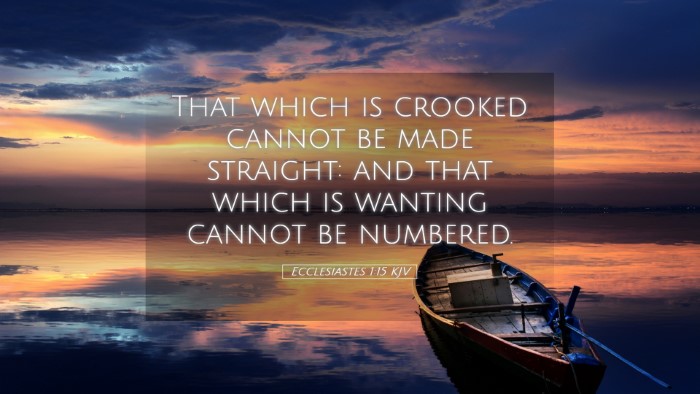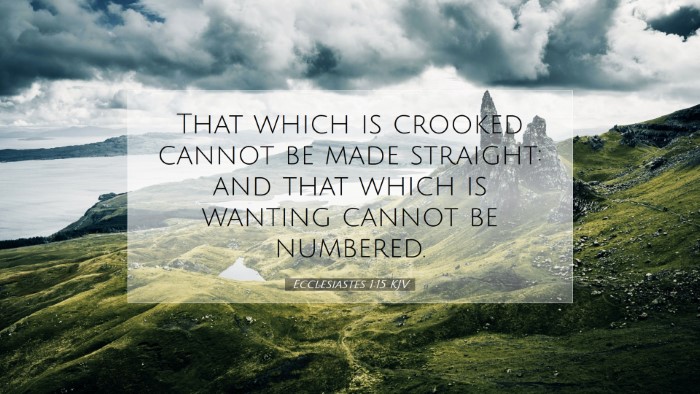Commentary on Ecclesiastes 1:15
Verse: Ecclesiastes 1:15 - "What is crooked cannot be made straight, and what is lacking cannot be numbered."
Introduction
This verse encapsulates a profound observation on the nature of life and the limitations of human endeavors. The author, traditionally recognized as King Solomon, contemplates the complexities and inherent imperfections in life. Drawing from various public domain commentaries, we can explore the depth of this verse and its implications for understanding human existence.
The Nature of Imperfection
Matthew Henry's Concise Commentary highlights that the crookedness mentioned refers to the moral distortions and imperfections in the world. Henry notes that while humanity strives to correct these wrongs, the fundamental crookedness of existence—both in a moral sense and a practical sense—can often feel insurmountable.
“What is crooked cannot be made straight” suggests that certain things cannot be adjusted or rectified, emphasizing the permanence of some aspects of human experience. The reality that some moral and ethical dilemmas have no straightforward solutions is articulated poignantly in this phrase.
The Limits of Human Understanding
Albert Barnes's Notes on the Bible elaborates on the notion of what is lacking not being numbered. This insight speaks to the limitations of human wisdom and understanding. Barnes asserts that there are aspects of life, such as sufferings and trials, that defy quantification or resolution through mere human effort.
He posits that it is not merely the absence of things that is being referenced, but the incapacity of humanity to fully grasp the reasons or the implications of what is absent. This aligns with broader themes within Ecclesiastes that emphasize the mystery of life and the futility of trying to attain complete knowledge or control over it.
Reflections on Human Effort
Adam Clarke’s Commentary offers a critical reflection on human endeavors in light of this verse. Clarke suggests that human beings often toil in vain to rectify what is fundamentally flawed in their lives and society, leading to a sense of existential despair. He emphasizes that human efforts are often met with frustration because true fulfillment and resolution lie beyond human capability.
This verse serves as a reminder to pastors and theologians that while striving for righteousness is noble, there is a recognition that some things remain outside our control. It urges a humility that acknowledges our limitations and points towards reliance on divine wisdom and intervention for ultimate understanding and resolution.
Theological Implications
The theological implications of Ecclesiastes 1:15 are significant. Matthew Henry points out that recognizing the crookedness in our lives should lead us to understand our reliance on God’s grace and providence. This understanding gently nudges believers towards a state of repentance and recognition of divine sovereignty.
“What is lacking cannot be numbered” invites a consideration of God’s infinite nature in the face of our finite understanding. The acknowledgement that there are aspects of God’s creation that surpass human comprehension reminds scholars of the mystery of faith. It highlights the tension between human experience and divine omniscience.
Practical Applications
- Recognizing Human Limitations: For pastors, it is crucial to communicate the importance of recognizing human limitations when counseling or aiding congregants. Emphasizing that not every problem has a solution can foster a culture of grace and compassion.
- Emphasizing Reliance on God: This verse serves as a reminder to depend on God's strength rather than solely on human efforts. The acknowledgment of our inadequacies can lead to deeper faith and reliance on divine providence.
- Encouraging Perseverance: For students and scholars, Ecclesiastes 1:15 can be a source of encouragement against discouragement. It reminds us that the struggle with life's complexities is shared among all humanity, and perseverance is a part of the faith journey.
- Promoting Humility: Understanding that some things are unchangeable fosters humility. It encourages believers to avoid judgment of others who struggle with what seems crooked in their lives.
Conclusion
In summary, Ecclesiastes 1:15 encapsulates deep existential truths about the nature of life, the limitations of human understanding, and the inevitability of imperfections. Drawing insights from Matthew Henry, Albert Barnes, and Adam Clarke, we can appreciate the weight of this passage as it draws us into a contemplative understanding of our existence.
The call to acknowledge the crookedness of life is a sobering yet liberating truth, reminding all—pastors, students, and scholars alike—of the need for grace, humility, and divine reliance in the pursuit of wisdom and understanding. Ultimately, it points to the grand narrative of hope found in Christ, where even the crooked can be made straight through Him.


